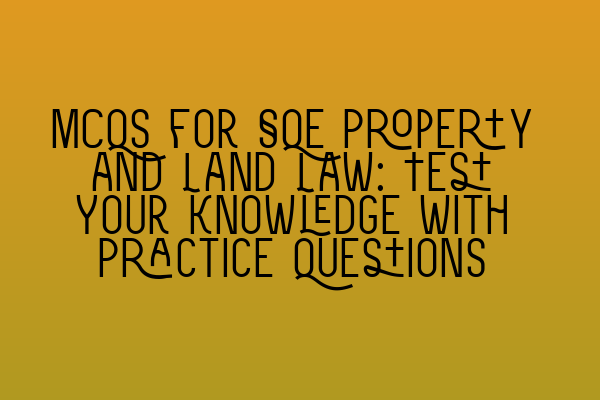Welcome to the SQE Property Law & Land Law blog. In this post, we will test your knowledge with a series of multiple-choice questions to help you prepare for the SQE Property and Land Law examination. These questions are designed to challenge your understanding of key concepts and principles in property and land law. So, let’s dive in and start testing your knowledge!
Question 1:
Which of the following is a freehold estate in land?
A) Leasehold
B) Life estate
C) Fee simple absolute
D) Easement
Click here to reveal the answer.
Question 2:
What is the primary purpose of a land registration system?
A) To identify the owners of registered land
B) To facilitate the transfer of land
C) To provide security of title
D) All of the above
Click here to reveal the answer.
Question 3:
Which of the following is an example of an equitable interest in land?
A) Legal charge
B) Fee simple absolute
C) Easement
D) Beneficial interest under a trust
Click here to reveal the answer.
Question 4:
What is the function of the Land Registry in England and Wales?
A) To maintain a register of land ownership
B) To record and protect property rights
C) To provide information on property ownership
D) All of the above
Click here to reveal the answer.
Question 5:
Which of the following is a valid method of acquiring title to land?
A) Adverse possession
B) Assignment
C) Mortgage
D) All of the above
Click here to reveal the answer.
Question 6:
What is the difference between legal and equitable interests in land?
A) Legal interests take priority over equitable interests
B) Legal interests are enforceable at law, while equitable interests require the intervention of a court of equity
C) Legal interests are recorded in the Land Registry, while equitable interests are not
D) All of the above
Click here to reveal the answer.
Question 7:
Which of the following is an example of an easement?
A) A right of way
B) A leasehold
C) A restricted covenant
D) A life estate
Click here to reveal the answer.
Question 8:
What is the effect of a leasehold estate?
A) It grants exclusive possession of the land for a fixed term
B) It gives the tenant a legal interest in the land
C) It creates a relationship of landlord and tenant
D) All of the above
Click here to reveal the answer.
Question 9:
What is the purpose of the doctrine of adverse possession?
A) To reward squatting
B) To encourage landowners to be vigilant in protecting their property
C) To provide a mechanism for resolving disputes over land ownership
D) None of the above
Click here to reveal the answer.
Question 10:
Which of the following is a condition for a valid contract of sale of land?
A) The contract must be in writing
B) The parties must have legal capacity to enter into a contract
C) The contract must contain all essential terms
D) All of the above
Click here to reveal the answer.
Answers:
Answer to Question 1: C) Fee simple absolute
Answer to Question 2: D) All of the above
Answer to Question 3: D) Beneficial interest under a trust
Answer to Question 4: D) All of the above
Answer to Question 5: D) All of the above
Answer to Question 6: D) All of the above
Answer to Question 7: A) A right of way
Answer to Question 8: D) All of the above
Answer to Question 9: B) To encourage landowners to be vigilant in protecting their property
Answer to Question 10: D) All of the above
How did you do? Were you able to answer all the questions correctly? If not, don’t worry, this is just a practice exercise to help you identify areas where you may need to further review your knowledge. Remember, property and land law can be complex, so it’s important to dedicate sufficient time to study and preparation.
If you found this practice exercise helpful, you may also be interested in our Interactive SQE Mock Tests for Contract Law: Test Your Knowledge. These tests cover a wide range of topics in contract law and can help you assess your understanding of the subject.
Additionally, if you’d like to learn more about recent changes in contract law, you can read our article on Contract Law Reforms: An Analysis of Recent Changes. It provides an in-depth analysis of significant reforms and their implications.
Understanding the rights and responsibilities of parties in a contract is crucial. To gain a comprehensive understanding, check out our article on Parties in a Contract: Rights and Responsibilities.
Ethics play a vital role in contract law. To explore the importance of ethics in contracts, we recommend reading our comprehensive guide on The Importance of Ethics in Contract Law: A Comprehensive Guide.
Lastly, if you want to delve deeper into the topics of duress and undue influence in contracts, we have an article that uncovers the intricacies of these concepts. You can find ithere.
Remember, practice makes perfect. Take advantage of all the resources available to you to enhance your understanding and to improve your chances of success in the SQE Property and Land Law examination. Good luck!
